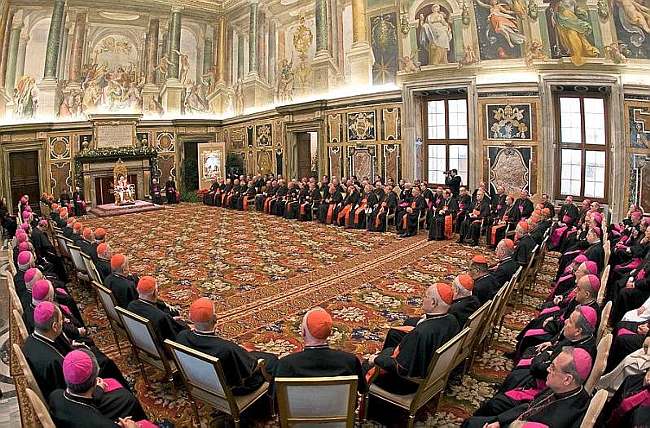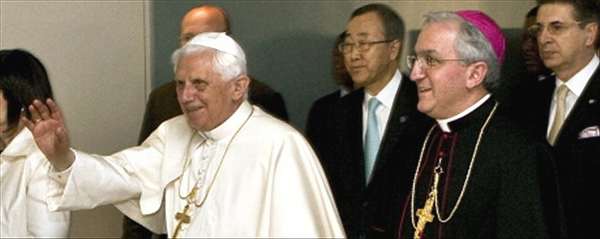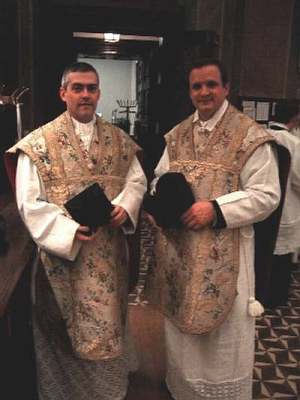Paven forsvarte verdensungdomsdagene, fokuserte på miljøvern, samt skaperordningene som gjelder menneskene
John Allen har en ganske annen vinkling på pave Benedikts tale til kuriaen i Vatikanet (der noen få ord i talen har fått homofile organisasjoner til å se rødt). Slik skriver John Allen:
Pope defends World Youth Day, environmental concern
It’s Vatican tradition for the pope to deliver a sort of “Year in Review” address to his staff in the Roman Curia each December, and over time these speeches have come to play two roles – one overt, the other implicit. The first is to give the pope a chance to frame how he’d like the year to be remembered; the second is to subtly defend aspects of his activity or teaching over the last 12 months which may have raised eyebrows, or set tongues wagging, in his own house.
This year, Benedict XVI used his annual address to the Curia, delivered the morning of Dec. 22, to highlight two such elements of his track record in ’08: World Youth Day, and his growing emphasis on environmentalism. He suggested that both pivot on a core Christian doctrine: the role of the Holy Spirit. … …
Et stykke nede i artikkelen skriver Allen at paven også kort tok opp miljøvern (som han forsvarte), samt de føringer skapelsen også la for menneskelig fellesskap (uten å nevne homofili i det hele tatt). Her er en engelsk oversettelse av denne delen av talen:
Since faith in the Creator is an essential part of the Christian Creed, the Church cannot and should not limit itself to transmitting to its faithful only the message of salvation. She has a responsibility for Creation, and it should validate this responsibility in public.
In so doing, it should defend not just the earth, water and air as gifts of Creation that belong to everyone. She should also protect man from destroying himself.
It is necessary to have something like an ecology of man, understood in the right sense. It is not outdated metaphysics when the Church speaks of the nature of the human being as man and woman, and asks that this natural order be respected.
This has to do with faith in the Creator and listening to the language of creation, which, if disregarded, would be man’s self-destruction and therefore a destruction of God’s work itself.
That which has come to be expressed and understood with the term ‘gender’ effectively results in man’s self-emancipation from Creation (nature) and from the Creator. Man wants to do everything by himself and to decide always and exclusively about anything that concerns him personally. But this is to live against truth, to live against the Spirit Creator.
The tropical rain forests deserve our protection, yes, but man does not deserve it less as a Creature of the Spirit himself, in whom is inscribed a message that does not mean a contradiction of human freedom but its condition.
The great theologians of Scholasticism described matrimony – which is the lifelong bond between a man and a woman – as a sacrament of Creation, that the Creator himself instituted, and that Christ, without changing the message of Creation, welcomed in the story of his alliance with men.
Part of the announcement that the Church should bring to men is a testimonial for the Spirit Creator present in all of nature, but specially in the nature of man, who was created in the image of God.
One must reread the encyclical Humanae vitae with this perspective: the intention of Pope Paul VI was to defend love against consumer sex, the future against the exclusive claim of the moment, and human nature against manipulation.











 Denne boka, som i Norge gis ut av Luther forlag i disse dager, heter opprinnelig «Come Be My Light», og kom ut i 2007, 10 år etter at Mor Teresa døde. Denne bemerkelsesverdige og verdensberømte nonnen mottok et «kall i kallet» til å tjene de fattigste av de fattige i Calcuttas slum. I denne oppsiktsvekkende biografien kan vi lese Mor Teresas private brev til sine åndelige veiledere, samlet i forbindelse med hennes helligkåringsprosess. Brevene avslører hittil ukjente dybder ved hennes åndelige liv og den paradoksale og uventede prisen hun måtte betale for sitt kall – at hun selv skulle leve i «fryktelig mørke». Dette var sider som var skjult for selv hennes aller nærmeste medarbeidere.
Denne boka, som i Norge gis ut av Luther forlag i disse dager, heter opprinnelig «Come Be My Light», og kom ut i 2007, 10 år etter at Mor Teresa døde. Denne bemerkelsesverdige og verdensberømte nonnen mottok et «kall i kallet» til å tjene de fattigste av de fattige i Calcuttas slum. I denne oppsiktsvekkende biografien kan vi lese Mor Teresas private brev til sine åndelige veiledere, samlet i forbindelse med hennes helligkåringsprosess. Brevene avslører hittil ukjente dybder ved hennes åndelige liv og den paradoksale og uventede prisen hun måtte betale for sitt kall – at hun selv skulle leve i «fryktelig mørke». Dette var sider som var skjult for selv hennes aller nærmeste medarbeidere.